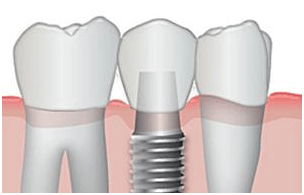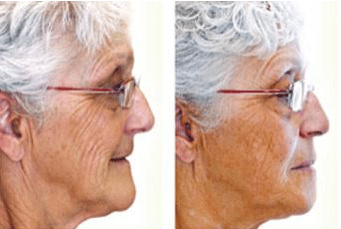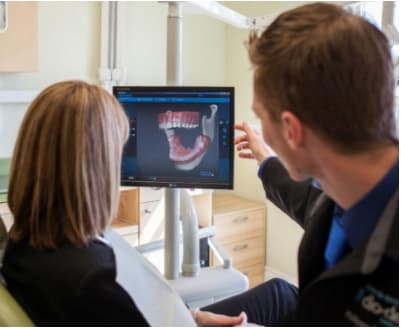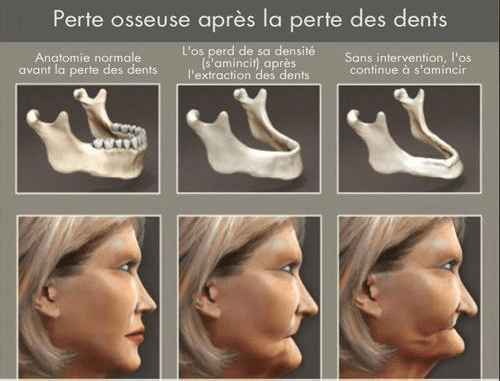Dental implant surgery to replace missing teeth and repair your smile is performed by Dr. Mazen Dagher at Hawkesbury Dental Centre.
Missing Teeth & Your Oral Health
It is possible to lose one or more teeth during one's adult lifetime, whether due to tooth decay, gum disease, an injury or an accident. Missing teeth can impact both your oral health and your appearance.
As teeth surrounding the gap gradually begin to shift out of place, alignment and bite issues (how your top and bottom teeth fit together) can make it more difficult to maintain proper oral hygiene and clear plaque from your teeth. Additionally, without the stimulation provided by the tooth, the jaw bone around the area can start to deteriorate, possibly resulting in drooping facial muscles and challenges with speaking and chewing.

- Learn More About Dental Implants
- Why choose our centre for your dental implants?
- Living with missing teeth
Dental implants: What are they?
A dental implant is a titanium anchor, a biocompatible material, that naturally bounds to the existing bone structure. It can be positioned in the upper or lower part of the jaw. After a recovery phase, it functions similarly to a natural tooth root. This helps stimulate the bone structure, maintaining the jaw’s volume and integrity. Dental implants can replace one or several teeth, or even an entire set of teeth. They are natural-looking and can closely resemble your natural dentition, helping you feel as if they are your own teeth.


Why choose dental implants for your treatment?
Dental implants offer a functional solution to tooth loss issues by serving as artificial roots for fixed dentures. They stimulate the bone structure, helping to preserve it by preventing bone resorption. Additionally, implant-supported dentures provide significantly greater chewing force, allowing you to enjoy foods you may have avoided for years.
Who is suitable for dental implants?
If you have lost teeth due to injury, disease, or tooth decay, or if you are dissatisfied with poorly fitting dentures, dental implants may be a suitable tooth replacement option for you.
Your dentist will carefully evaluate your medical and dental history to determine whether dental implants are suitable for your specific situation.
Your overall health and the density of your jawbone are important factors in determining whether you are a candidate for dental implant surgery. Jawbone density is crucial, the dentist will need to surgically place the dental implant into your jaw.
If you are able to undergo tooth extraction or other oral surgery, dental implants may be a viable option for you.


Are dental implants painful?
The dentist will administer anesthesia during your dental implant surgery to ensure your comfort throughout the procedure.
Advancements in technology and dental sedation options have made dental implant procedures less painful and with shorter recovery times than in the past.
Patients do not typically experience significant discomfort following their surgery. However, for the first couple of weeks after the procedure, a soft diet is recommended to minimize any potential discomfort or irritation. In general, most patients can gradually resume eating and smiling normally within a few weeks. Over-the-counter pain medication may be used to help manage any discomfort in the first few days following the procedure.
What steps are involved in the treatment process?
As completing the treatment may require multiple visits, we provide our patients with temporary teeth to ensure they can carry out their daily activities comfortably and confidently.
To start, the dentist will surgically anchor the implant (a small titanium screw) in your jaw bone, underneath the gum tissue. Titanium is a biocompatible material, so during healing, the implant will naturally bond with your gums and jaw.
The implant area generally takes between three and nine months to fully heal and bond. During this time, it's important to take your time to recover and follow the dentist's instructions, taking meticulous care of your mouth to prevent complications.
The last step is to have the implant topped with a suitable tooth replacement, a process which itself may take a few appointments to complete. The replacement may be a dental crown or denture, depending on the number of implants you've had placed.
Once the implant process is complete, the implant functions as a natural tooth root, helping to stimulate the bone structure and maintain the volume and integrity of your jaw.


The cost of dental implants
The price of a dental implant is determined by multiple criteria, such as the number of teeth to replace and the number of implants required to support your replacement teeth.
You don’t necessarily need an implant for each missing tooth. To provide an accurate estimate, we will conduct an extensive diagnostic evaluation and recommend the most appropriate treatment options for you.
Reimbursement and financing
In certain cases, insurance companies cover a portion of the cost. You can also claim a part of the expenses on your income tax return. In addition, we offer flexible financing options for virtually every budget. Schedule your free consultation today and discover how we can improve your oral health!

Why choose the Hawkesbury Dental Centre for your dental implants?
Whether it's for a standard treatment or a more complex cosmetic and functional makeover, our team is dedicated to your dental well-being. Each member of our team is committed to paying close attention to your overall well-being. At the Hawkesbury Dental Centre, we do our utmost to put you at ease. Please don’t hesitate to express any concerns you may have. We will take the time to discuss them with you.


Meet Dr. Mazen Dagher, General Dentist
Dr. Dagher is the founder of the Hawkesbury Dental Centre. He has over 17 years of experience in cosmetic dentistry and is an instructor in the implantology industry.
Dr. Dagher graduated from the Université de Montréal in 1996. He has since acquired knowledge in dental implantology, cosmetic and reconstructive dentistry at the Kois Center for Advanced Dentistry in Washington, at the Kois Center in Seattle, at the Canadian Implantology Institute in Michigan and at the Institut Sapo-Implant de l’Université Paul IV in Paris. Dr. Dagher can provide services in:
- Oral reconstruction on natural teeth with or without implants
- Complex reconstruction requiring bone grafting for an implant procedure
- Complex reconstruction including sinus lifting, bone grafting and implant
Our dental technology
At the Hawkesbury Dental Centre, we invest in technology so that our dental team can have access to tools that support them in treating a patient. We are equipped with diagnostic technologies including intraoral cameras, microscopes and extremely low radiation radiography. We use software solutions such as Simplant, which provides 3D imaging for implantology purposes. This tool allows us to plan our treatments more efficiently as the 3D reconstruction technology provides more precision while accelerating the processing time.


Implants and dentures under one roof
We are proud to be able to offer every dental care related to implantology and aesthetics dentistry under one roof, including implant placement, grafting and bone reconstruction surgeries as well as the production and the adjustment of implant-supported dentures.
Planning your stay if you live far away
We have had the privilege of treating patients from all across Ontario and Quebec who have undergone 'Smile Makeover' and implantology services with us. Our patient experience director, will be pleased to assist you in planning your travel and accommodation arrangements during your treatment.


Support for Anxious Patients: Sleep While We Treat
People may experience anxiety or worry before going to the dentist, which can keep them from receiving the necessary dental care. If this sounds like you, don't panic.
Dental sedation can be offered to those who feel a high level of anxiety during dental appointments. At our practice, we offer IV sedation that allows you to be completely unconscious or semi-conscious according to your comfort level.
I have one or several missing teeth
Many solutions are available to palliate the consequences of tooth loss. One could choose to use removable dentures. The dentures are maintained in place by 'fixing themselves' on the adjacent teeth. However, some people may find this is not the most comfortable solution. One could also consider a dental bridge. The latter is also made of false teeth and supported by the surrounding teeth. This solution is fixed, the patient cannot remove it.
The inconvenience of this type of treatment is that it could damage healthy teeth as it requires the milling of adjacent teeth. The biggest inconvenience of these solutions is that they don’t stop the reduction of the bone density where the teeth are missing. When one or several teeth are missing, the underlying bone loses its stimulation because when masticating (chewing), no pressure is applied on the root inside. The latter eventually resorbs.
The reduction of the bone density can cause a physiognomic change over time. This accentuates, for example, the aging effect of an individual’s face. This is particularly the case when the missing teeth are frontal. The lip collapses and the chin rises towards the nose because the jaw lost its volume, an essential element to preserve a balanced facial structure. This phenomenon applies to every patient with complete or partial dentures without implants.


I wear full dentures
People who wear a full denture (commonly called a denture) must limit the choice of their food. They may also be subject to some discomfort, such as pain during chewing. They may also experience some social discomfort due to the nature of the prosthesis. Those who wear prostheses for many years find that the pink part of the prosthesis that simulates the gums gradually occupies more space on their prosthesis. Updates to the prosthesis prove necessary over time due to the bone resorption of the jaw. Since the jaw is free of dental roots, the bone is no longer stimulated and reabsorbs with time. When laboratories manufacture new prostheses, they usually compensate for this loss by false gums, which become more and more bulky over time.
The information provided is general information that may not apply to each patient's unique case.

